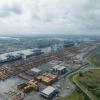News
Displaying Results 26 - 50 of 122
The Asia-Pacific region is home to some of the world's largest and most diverse reserves of minerals, energy, water, and biomass. The region accounts for around 70% of global mining production and consumption, including most of the world's bauxite, copper, iron, nickel, silver, tin, and zinc. …
Sound emission inventories are the first step for designing effective clean air policies as they provide information about the main sources and the most acute air pollution problems in a country.
Under the Convention on Long-range Transboundary Air Pollution (Air Convention), UNECE has therefore…
The Republic of Moldova is almost entirely dependent on energy imports as it has no domestic sources of fossil fuels and makes only limited use of its renewable energy potential. At the same time, the energy intensity in the country is 3.4 times higher than the average energy intensity in the…
Taking up some of the main results of the recent review report, which assessed the effectiveness of the amended Protocol to Abate Acidification, Eutrophication and Ground-Level Ozone (Gothenburg Protocol) under the UNECE Convention on Long-range Transboundary Air Pollution, experts discussed…
The results of the recent review report, which assessed the effectiveness of the amended Protocol to Abate Acidification, Eutrophication and Ground-Level Ozone (Gothenburg Protocol) under the UNECE Convention on Long-range Transboundary Air Pollution, have triggered further discussions among…
Breathing clean air is a necessity for everyone and decent air quality is a shared responsibility that can only be achieved if we work together. This is what Member States in the UNECE region realized 45 years ago, when they started negotiating the first multilateral, legally binding treaty to cut…
UNECE and partners have started implementation of a multi-year project on “Improving the energy efficiency of the global building supply chain industry and its products to deliver high performance buildings” (full project budget EUR 19.8 million), funded by the International Climate Initiative (IKI…
The Norwegian Government has issued a Mineral Strategy which necessitates the Geological Survey of Norway to produce an inventory aligned with the United Nations Framework Classification for Resources (UNFC).
UNFC will be crucial in this strategy as it will be used to classify mineral resources…
While underground coal mining in Albania stopped almost wholly (except for two private mines with a very insignificant output) more than 15 years ago, the abandonment of the mines from the 1990s onwards with no proper plans for closure has left a legacy of risks. These include water contamination,…
As the global economy emerges from the COVID-19 pandemic and governments strengthen efforts to “build-back-better”, trade as an engine of growth has re-emerged in policy agendas. For developing countries and countries with economies in transition that are still in the process of accession to the…
To address the conclusions of the review of the amended Protocol to Abate Acidification, Eutrophication and Ground-Level Ozone (Gothenburg Protocol), as adopted by the Executive Body to the UNECE Convention on Long-range Transboundary Air Pollution in December 2022, further work is currently being…
20 May marks the World Metrology Day, celebrating the international system of units, which coincides with the anniversary of the signing of the Metre Convention in 1875. This treaty created the International Bureau of Weights and Measures (BIPM) which coordinate international metrology and the…
Representatives from Kazakhstan, Kyrgyzstan, Tajikistan, and Uzbekistan met at the United Nations Economic Commission for Europe (UNECE) to discuss ways to unlock the resource potential and promote a sustainable future in Central Asia. The meeting was part of the UNECE Resource Management Week 2023…
Research on and monitoring of the effects of air pollution on different environmental media and health has been carried out for more than four decades under the UNECE Convention on Long-range Transboundary Air Pollution. The data and research that has emerged from these efforts is unique as it…
Air pollutants are not only harming human health and the environment but are also degrading surfaces of historical buildings and monuments. Corrosion and soiling of cultural heritage sites as a result of air pollution can lead to severe economic losses as a result of high maintenance and…
Young professionals from industry, academia, and civil society came together to discuss and explore solutions for sustainable resource management at the UNECE Resource Management Week 2023. Hosted by the UNECE Resource Management Young Member Group (RMYMG), the highly interactive session provided a…
In a move towards sustainable resource management, several countries have presented case studies of how the United Nations Framework Classification for Resources (UNFC) can scale-up harmonized resource management. UNFC provides a common language and standards for the classification of all energy…
Artificial intelligence (AI) is becoming more prominent in the world that surrounds us even if it has existed for a good deal of time. The Internet search engines have been using AI to identify articles that correspond with our search, enabling product advertisers to correlate their marketing with…
The massive use of fertilizers and the production and use of manure in agriculture over the past 100 years have led to significant reactive nitrogen emissions to air and releases to water and land. Burning of fossil fuels (in vehicles, power plants and industry) is another source of reactive…
Significant energy price increases arising from the war in Ukraine are having a negative impact on food production capabilities and costs in Georgia, especially in rural areas. This threatens to weaken the competitiveness of producers and increase their vulnerability to poverty. Reducing energy…
Adopted in 1963, the UNECE Standard S-1 concerning the certification and commercial quality control of seed potatoes provides a framework for the international trade of seed potatoes. It is currently the only international standard that ensures that seed potatoes meet specific and harmonized…
A recent study published in The Lancet found that almost the whole world's population was exposed to unsafe levels of air pollution in 2019, with only a mere 0.001 percent breathing air that contains fine particulate matter (PM2.5) at concentrations lower than what the World Health Organization…
What are emission inventories and what purpose do they serve? Why is it important to develop emission inventories? If you don’t know the answer to these questions, you might be interested in taking the e-learning course on How to report emissions under the Convention on Long-range Transboundary Air…
While the impacts of air pollution on vegetation and crops are sometimes overlooked, they can take a high toll on food production. As the food and energy crises have recently shown the vulnerability of our food systems, the impacts of air pollution on agricultural yields and food production should…
Standards touch nearly every aspect of our daily life through all the products that we use and consume each day (for example, mobile phones, vehicles, cleaning products, personal protection equipment, toys, and others). When they are produced or introduced on the market, products are checked for…


























